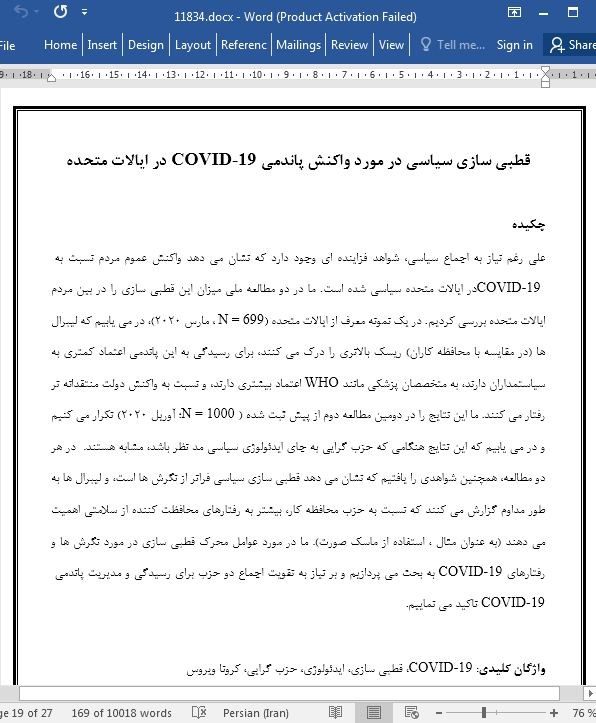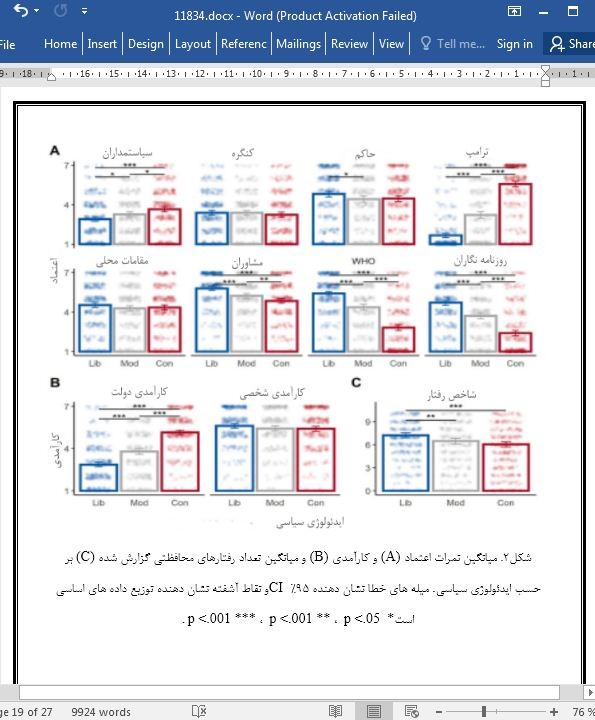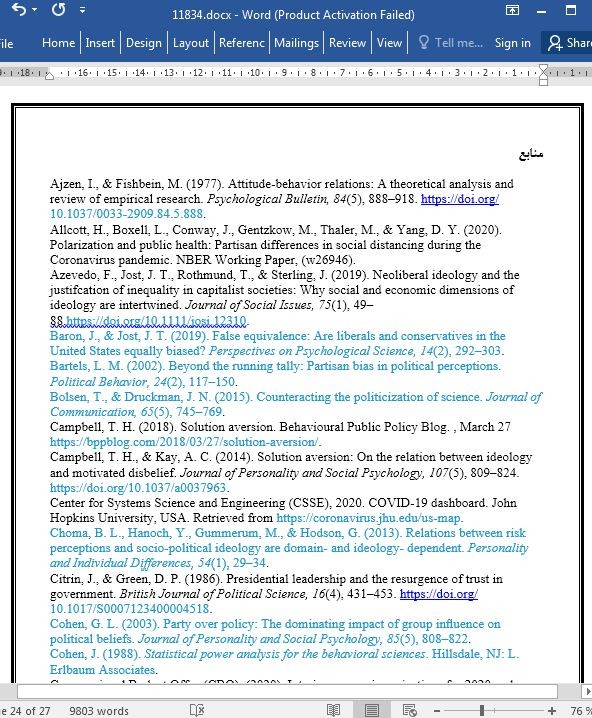
قطبی سازی سیاسی در مورد واکنش پاندمی COVID-19 در ایالات متحده
چکیده
علی رغم نیاز به اجماع سیاسی، شواهد فزاینده ای وجود دارد که نشان می دهد واکنش عموم مردم نسبت به COVID-19 در ایالات متحده سیاسی شده است. ما در دو مطالعه ملی میزان این قطبی سازی را در بین مردم ایالات متحده بررسی کردیم. در یک نمونه معرف از ایالات متحده (N = 699 ، مارس 2020)، در می یابیم که لیبرال ها (در مقایسه با محافظه کاران) ریسک بالاتری را درک می کنند، برای رسیدگی به این پاندمی اعتماد کمتری به سیاستمداران دارند، به متخصصان پزشکی مانند WHO اعتماد بیشتری دارند، و نسبت به واکنش دولت منتقدانه تر رفتار می کنند. ما این نتایج را در دومین مطالعه دوم از پیش ثبت شده (N = 1000 ؛ آوریل 2020) تکرار می کنیم و در می یابیم که این نتایج هنگامی که حزب گرایی به جای ایدئولوژی سیاسی مد نظر باشد، مشابه هستند. در هر دو مطالعه، همچنین شواهدی را یافتیم که نشان می دهد قطبی سازی سیاسی فراتر از نگرش ها است، و لیبرال ها به طور مداوم گزارش می کنند که نسبت به حزب محافظه کار، بیشتر به رفتارهای محافظت کننده از سلامتی اهمیت می دهند (به عنوان مثال ، استفاده از ماسک صورت). ما در مورد عوامل محرک قطبی سازی در مورد نگرش ها و رفتارهای COVID-19 به بحث می پردازیم و بر نیاز به تقویت اجماع دو حزب برای رسیدگی و مدیریت پاندمی COVID-19 تاکید می نماییم.
1. مقدمه
"این چیزی نیست که بتوان از آن برای سیاست استفاده کرد. مثل بازی با آتش است ...لطفا در این رابطه مطابق با خطمشی حزب، ایدئولوژی، اعتقادات و هر گونه اختلافی رفتار کنید. با این رفتار است که می توانیم این ویروس را شکست دهیم".
(Tedros Ghebreyesus، مدیر کل سازمان بهداشت جهانی، 2020 ، ص6).
همانطور که کشورهای سراسر جهان در حال طراحی سیاست ها و مقرراتی برای مبارزه و مهار یک پاندمی جهانی هستند، بیش از نیم میلیون مرگ به دلیل ویروس جدید کرونا (SARS-CoV-2) ثبت شده است که تقریباً یک چهارم آن ها فقط در ایالات متحده اتفاق افتاده است (CSSE ، 2020). در شرایط عدم وجود یک واکسن مقیاس پذیر یا درمان ضد ویروسی موثر، محققان به طور فزاینده ای به نقش مهم علوم اجتماعی در ارزیابی عقاید عمومی و تأثیر مداخلات غیر دارویی (Van Bavel و همکاران، 2020) مانند استفاده از ماسک، رعایت فاصله اجتماعی، شستن دست و خود انزوایی اشاره کرده اند. نکته مهم اینجاست که تأثیر این مداخلات نه تنها به درک علمی و فزاینده در مورد پویایی انتقال ویروس بستگی دارد (Zhang، Li، Zhang، Wang، & Molina، 2020) بلکه به میزان پذیرش و هماهنگ سازی رفتار افراد بطور داوطلبانه در جامعه در دو مقیاس محلی و جهانی نیز بستگی دارد. همانطور که مدیرکل WHO هشدار می دهد، افزایش قطبی سازی سیاسی تهدید مستقیمی برای مدیریت موثر این پاندمی است.
4. بحث
جهت گیری سیاسی با دیدگاه های مربوط به مسائل اجتماعی مرتبط است (Jost و همکاران، 2003؛ Sterling، Jost، & Hardin، 2019) و نتایج دو مطالعه ارائه شده در اینجا، نشان می دهد COVID-19 نیز از این قاعده مستثنی نیست. ما در دو مطالعه ملی، گزارش می کنیم که ایدئولوژی سیاسی محافظه کارانه با اعتماد قابل توجهی نسبت به مقامات دولتی برای مدیریت COVID-19، اعتماد کمتر به دانشمندان و WHO و کاهش درک خطر ویروس همراه است. همچنین گزارش می کنیم که این تفاوتهای ایدئولوژیکی به طور قابل توجهی با رفتار مرتبط است: شرکت کنندگان محافظه کار اقدامات محافظتی کمتری مانند استفاده از ماسک یا شستن دست را گزارش کردند. در مورد مطالعه 2، پایداری و ثبات نتایج اثبات شد و با معیار دیگری از جهت گیری سیاسی مورد تایید قرار گرفت: شناسایی حزب (به مطالب تکمیلی مراجعه کنید). این تأثیرات نیز ناچیز نبودند، و تقریباً همه اختلافات مهم حزبی اندازه های تاثیر استانداری را در محدوده متوسط تا زیاد نشان دادند (Cohen، 1988؛ Funder & Ozer، 2019).
Abstract
Despite calls for political consensus, there is growing evidence that the public response to the COVID-19 pandemic has been politicized in the US. We examined the extent to which this polarization exists among the US public across two national studies. In a representative US sample (N = 699, March 2020) we find that liberals (compared to conservatives) perceive higher risk, place less trust in politicians to handle the pandemic, are more trusting of medical experts such as the WHO, and are more critical of the government response. We replicate these results in a second, pre-registered study (N = 1000; April 2020), and find that results are similar when considering partisanship, rather than political ideology. In both studies we also find evidence that political polarization extends beyond attitudes, with liberals consistently reporting engaging in a significantly greater number of health protective behaviors (e.g., wearing face masks) than conservatives. We discuss the possible drivers of polarization on COVID-19 attitudes and behaviors, and reiterate the need for fostering bipartisan consensus to effectively address and manage the COVID-19 pandemic.
1. Introduction
“This is not the one to use for politics. It’s like playing with fire… Please work across party lines, across ideology, across beliefs, across any differences for that matter. We need to behave. That’s how we can defeat this virus.
” (Tedros Ghebreyesus, Director-General, World Health Organization, 2020, p. 6)
As countries around the world are designing policies and legislation to fight and contain a global pandemic, over half a million deaths have been recorded due to the novel coronavirus (SARS-CoV-2) with almost a quarter of those deaths occurring in the United States alone (CSSE, 2020). In the absence of a scalable vaccine or effective antiviral treatment, scholars have increasingly noted the important role of the social sciences in evaluating public opinion and the impact of nonpharmaceutical interventions (Van Bavel et al., 2020) such as mask wearing, social distancing, hand washing, and self-isolation. Crucially, the effectiveness of these interventions not only depends on an emerging scientific understanding of viral transmission dynamics (Zhang, Li, Zhang, Wang, & Molina, 2020) but also on the degree to which people voluntarily adopt and coordinate their behavior in the population at both local and global scales. As the Director-General of the WHO warns, increasing political polarization presents a direct threat to the effective management of the pandemic.
4. Discussion
Political orientation is associated with views on a panoply of social issues (Jost et al., 2003; Sterling, Jost, & Hardin, 2019), and the results of the two studies presented here show COVID-19 is no exception. Across two national studies we report that conservative political ideology is significantly linked to greater trust in government authorities to manage COVID-19, lower trust in scientists and the WHO and lower perceived risk of the virus. We also report that these ideological differences are significantly associated with behavior: conservative participants reported fewer protective actions such wearing a mask or handwashing. In the case of Study 2, results proved robust and were further corroborated with an alternative measure of political orientation: party identification (see supplementary materials). These effects were also not trivial, nearly all significant partisan differences revealed standardized effect-sizes in the range of medium to high (Cohen, 1988; Funder & Ozer, 2019).
چکیده
1. مقدمه
1.1. سیاسی سازی علم
1.2. قطبی سازی در مورد COVID-19
1.3. مطالعه حاضر
2. مطالعه 1
2.1. روشها
2.2. نتایج
3. مطالعه 2
3.1 روشها
3.2 نتایج
4. بحث
منابع
Abstract
1. Introduction
1.1. Politicization of science
1.2. Polarization on COVID-19
1.3. Present study
2. Study 1
2.1. Methods
2.2. Results
3. Study 2
3.1. Methods
3.2. Results
4. Discussion
References
- اصل مقاله انگلیسی با فرمت ورد (word) با قابلیت ویرایش
- ترجمه فارسی مقاله با فرمت ورد (word) با قابلیت ویرایش، بدون آرم سایت ای ترجمه
- ترجمه فارسی مقاله با فرمت pdf، بدون آرم سایت ای ترجمه



